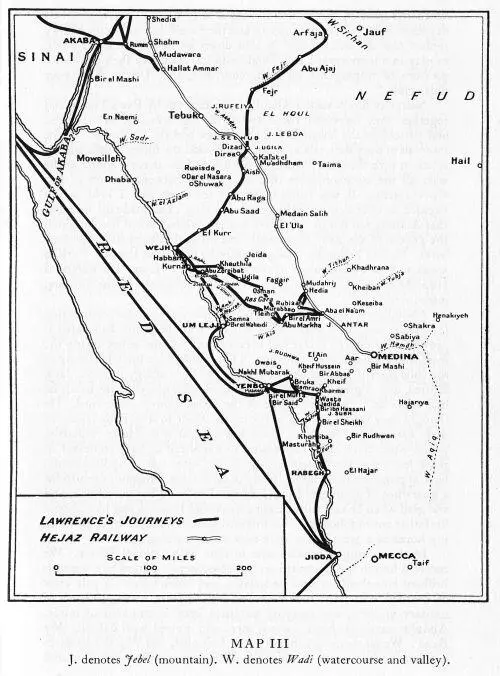The atmosphere was oppressive, deadly. There seemed no life in it. It was not burning hot, but held a moisture and sense of great age and exhaustion such as seemed to belong to no other place: not a passion of smells like Smyrna, Naples or Marseilles, but a feeling of long use, of the exhalations of many people, of continued bath-heat and sweat. One would say that for years Jidda had not been swept through by a firm breeze: that its streets kept their air from year's end to year's end, from the day they were built for so long as the houses should endure. There was nothing in the bazaars to buy.
 Map 3
Map 3
In the evening the telephone rang; and the Sherif called Storrs to the instrument. He asked if we would not like to listen to his band. Storrs, in astonishment, asked What band? and congratulated his holiness on having advanced so far towards urbanity. The Sherif explained that the headquarters of the Hejaz Command under the Turks had had a brass band, which played each night to the Governor General; and when the Governor General was captured by Abdulla at Taif his band was captured with him. The other prisoners were sent to Egypt for internment; but the band was excepted. It was held in Mecca to give music to the victors. Sherif Hussein laid his receiver on the table of his reception hall, and we, called solemnly one by one to the telephone, heard the band in the Palace at Mecca forty-five miles away. Storrs expressed the general gratification; and the Sherif, increasing his bounty replied that the band should be sent down by forced march to Jidda, to play in our courtyard also, 'And,' said he, 'you may then do me the pleasure of ringing me up from your end, that I may share your satisfaction.'
Next day Storrs visited Abdulla in his tent out by Eve's Tomb; and together they inspected the hospital, the barracks, the town offices, and partook of the hospitality of the Mayor and the Governor. In the intervals of duty they talked about money, and the Sherif s tide, and his relations with the other Princes of Arabia, and the general course of the war: all the commonplaces that should pass between envoys of two Governments. It was tedious, and for the most part I held myself excused, as after a conversation in the morning I had made up my mind that Abdulla was not the necessary leader. We had asked him to sketch the genesis of the Arab movement: and his reply illuminated his character. He had begun by a long description of Talaat, the first Turk to speak to him with concern of the restlessness of Hejaz. He wanted it properly subdued, and military service, as elsewhere in the Empire, introduced.
Abdulla, to forestall him, had made a plan of peaceful insurrection for Hejaz, and, after sounding Kitchener without profit, had dated it provisionally for 1915. He had meant to call out the tribes during the feast, and lay hold of the pilgrims. They would have included many of the chief men of Turkey besides leading Moslems of Egypt, India, Java, Eritrea, and Algiers. With these thousands of hostages in his hands he had expected to win the notice of the Great Powers concerned. He thought they would bring pressure on the Porte to secure the release of their nationals. The Porte, powerless to deal with Hejaz militarily, would either have made concessions to the Sherif or have confessed its powerlessness to the foreign States. In the latter event, Abdulla would have approached them direct, ready to meet their demands in return for a guarantee of immunity from Turkey. I did not like his scheme, and was glad when he said with almost a sneer that Feisal in fear had begged his father not to follow it. This sounded good for Feisal, towards whom my hopes of a great leader were now slowly turning.
In the evening Abdulla came to dine with Colonel Wilson. We received him in the courtyard on the house steps. Behind him were his brilliant household servants and slaves, and behind them a pale crew of bearded, emaciated men with woe-begone faces, wearing tatters of military uniform, and carrying tarnished brass instruments of music. Abdulla waved his hand towards them and crowed with delight, 'My Band'. We sat them on benches in the forecourt, and Wilson sent them cigarettes, while we went up to the dining room, where the shuttered balcony was opened right out, hungrily, for a sea breeze. As we sat down, the band, under the guns and swords of Abdulla's retainers, began, each instrument apart, to play heartbroken Turkish airs. Our ears ached with noise; but Abdulla beamed.
Curious the party was. Abdulla himself, Vice-President in partibus of the Turkish Chamber and now Foreign Minister of the rebel Arab State; Wilson, Governor of the Red Sea Province of the Sudan, and His Majesty's Minister with the Sherif of Mecca; Storrs, Oriental Secretary successively to Gorst, Kitchener and McMahon in Cairo; Young, Cochrane, and myself, hangers-on of the staff; Sayed Ali, a general in the Egyptian Army, commander of the detachment sent over by the Sirdar to help the first efforts of the Arabs; Aziz el Masri, now Chief of Staff of the Arab regular army, but in old days Enver's rival, leader of the Turkish and Senussi forces against the Italians, chief conspirator of the Arab officers in the Turkish army against the Committee of Union and Progress, a man condemned to death by the Turks for obeying the Treaty of Lausanne, and saved by The Times and Lord Kitchener.
We got tired of Turkish music, and asked for German. Aziz stepped out on the balcony and called down to the bandsmen in Turkish to play us something foreign. They struck shakily into 'Deutschland uber Alles' just as the Sherif came to his telephone in Mecca to listen to the music of our feast. We asked for more German music; and they played 'Eine feste Burg'. Then in the midst they died away into flabby discords of drums. The parchment had stretched in the damp air of Jidda. They cried for fire; and Wilson's servants and Abdulla's bodyguard brought them piles of straw and packing cases. They warmed the drums, turning them round and round before the blaze, and then broke into what they said was the Hymn of Hate, though no one could recognize a European progression in it all. Sayed Ali turned to Abdulla and said, 'It is a death march'. Abdulla's eyes widened; but Storrs who spoke in quickly to the rescue turned the moment to laughter; and we sent out rewards with the leavings of the feast to the sorrowful musicians, who could take no pleasure in our praises, but begged to be sent home. Next morning I left Jidda by ship for Rabegh.
Table of Contents
Moored in Rabegh lay the Northbrook , an Indian Marine ship. On board was Colonel Parker, our liaison officer with Sherif Ali, to whom he sent my letter from Abdulla, giving Ali the father's 'orders' to send me at once up to Feisal. Ah' was staggered at their tenour, but could not help himself; for his only telegraph to Mecca was by the ship's wireless, and he was ashamed to send personal remonstrances through us. So he made the best of it, and prepared for me his own splendid riding-camel, saddled with his own saddle, and hung with luxurious housings and cushions of Nejd leather-work pieced and inlaid in various colours, with plaited fringes and nets embroidered with metal tissues. As a trustworthy man he chose out Tafas el Raashid, a Hawazim Harb tribesman, with his son, to guide me to Feisal's camp.
He did all this with the better grace for the countenance of Nuri Said, the Bagdadi staff officer, whom I had befriended once in Cairo when he was ill. Nuri was now second in command of the regular force which Aziz el Masri was raising and training here. Another friend at court was Faisel Ghusein, a secretary. He was a Sulut Sheikh from the Hauran, and a former official of the Turkish Government, who had escaped across Armenia during the war, and had eventually reached Miss Gertrude Bell in Basra. She had sent him on to me with a warm recommendation.
Читать дальше

 Map 3
Map 3










